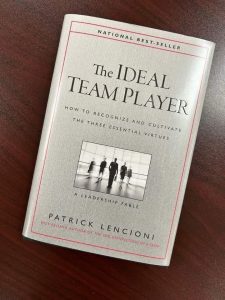Profound Lessons from “The Ideal Team Player : How to Recognize and Cultivate the Three Essential Virtues” by Patrick M. Lencioni
: How to Recognize and Cultivate the Three Essential Virtues” by Patrick M. Lencioni
1. The Three Essential Virtues: The ideal team player embodies three key virtues: Humility, Hunger, and People Smarts. Lencioni emphasizes that these traits are crucial for fostering collaboration and achieving team success.
2. Humility as a Foundation: Humility is essential for effective teamwork. The book highlights that humble individuals prioritize the team’s success over personal recognition, making them more approachable and supportive colleagues.
3. The Importance of Hunger: A strong work ethic and a desire to learn and grow are critical for team players. Lencioni explains that hungry individuals are proactive, take initiative, and go above and beyond to contribute to the team’s objectives.
4. People Smarts Matter: Emotional intelligence and interpersonal skills are vital for building strong relationships. The author emphasizes that being “people smart” enables team players to communicate effectively, understand others’ emotions, and navigate social dynamics.
5. Assessing Team Dynamics: Evaluating team members against the three virtues can help identify strengths and areas for improvement. Lencioni encourages leaders to assess their teams based on humility, hunger, and people skills to build a more cohesive unit.
6. Hiring for Fit: Prioritizing cultural fit over technical skills during hiring can lead to more successful teams. The book suggests that selecting candidates who exhibit the three virtues leads to better collaboration and overall performance.
7. Cultivating the Virtues: Leaders play a crucial role in developing the virtues within their teams. Lencioni advocates for creating a supportive environment that encourages growth in humility, hunger, and people skills, fostering a culture of continuous improvement.
8. Addressing Dysfunction: Recognizing and addressing dysfunctions in team dynamics is essential for success. The book highlights common dysfunctions, such as lack of trust or avoidance of accountability, and emphasizes the need to confront
these issues directly.
9. The Value of Feedback: Constructive feedback is key to personal and team development. Lencioni stresses that open communication and regular feedback can help team members improve their virtues and enhance overall team performance.
10. Creating a Team-Oriented Culture: Building a culture that values teamwork and collaboration leads to greater success. The author encourages leaders to prioritize team-oriented values, ensuring that all members feel valued and aligned toward common goals.
BOOK: https://amzn.to/4ggD8Y8
You can also get the Audio book for FREE using the same link. Use the link to register for the Audio book on Audible and start enjoying it.
These profound lessons from “The Ideal Team Player” provide valuable insights into the qualities that contribute to effective teamwork and leadership, empowering individuals and organizations to cultivate a culture of collaboration and mutual support.
Peoplesmind
